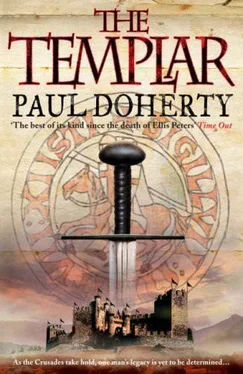P. Doherty - The Templar
Здесь есть возможность читать онлайн «P. Doherty - The Templar» весь текст электронной книги совершенно бесплатно (целиком полную версию без сокращений). В некоторых случаях можно слушать аудио, скачать через торрент в формате fb2 и присутствует краткое содержание. Год выпуска: 2010, ISBN: 2010, Издательство: Minotaur Books, Жанр: Исторические приключения, на английском языке. Описание произведения, (предисловие) а так же отзывы посетителей доступны на портале библиотеки ЛибКат.
- Название:The Templar
- Автор:
- Издательство:Minotaur Books
- Жанр:
- Год:2010
- ISBN:9780312576837
- Рейтинг книги:5 / 5. Голосов: 1
-
Избранное:Добавить в избранное
- Отзывы:
-
Ваша оценка:
- 100
- 1
- 2
- 3
- 4
- 5
The Templar: краткое содержание, описание и аннотация
Предлагаем к чтению аннотацию, описание, краткое содержание или предисловие (зависит от того, что написал сам автор книги «The Templar»). Если вы не нашли необходимую информацию о книге — напишите в комментариях, мы постараемся отыскать её.
The Templar — читать онлайн бесплатно полную книгу (весь текст) целиком
Ниже представлен текст книги, разбитый по страницам. Система сохранения места последней прочитанной страницы, позволяет с удобством читать онлайн бесплатно книгу «The Templar», без необходимости каждый раз заново искать на чём Вы остановились. Поставьте закладку, и сможете в любой момент перейти на страницу, на которой закончили чтение.
Интервал:
Закладка:
‘The Poor Brethren of the Temple,’ retorted Hugh, walking forward. ‘We took the idea from the psalm about living in the Lord’s house all the days of our lives.’
‘Yes, I know it.’ Beltran let the banner ripple towards Hugh, who caught it and held it up. The nave rang with cheers. Swords, daggers, spears and axes were raised to shouts of ‘ Deus vult , Jerusalem!’ and ‘Toulouse, Toulouse!’ Father Alberic shrugged and came down from his pulpit, and Hugh ordered the feasting to begin.
The following morning the Poor Brethren of the Temple left a little later than had been decided, the sun already high above the grassy slopes and black volcanic rock of the surrounding countryside. The cause of the delay was the sudden death of Robert the Reeve, who had apparently staggered out, deep in his cups, and drowned trying to cross a stream. A most unfortunate mishap. God knows, there was a footbridge nearby, whilst nobody could explain why Robert was stumbling around God’s Acre in the dark. Nevertheless, they found him floating face down, dead as wood. Father Alberic murmured the words of absolution and they buried Robert quickly beneath the ancient yew trees. Imogene the widow remarked how the reeve was already in the new Jerusalem. Father Alberic heard this and quietly prayed it was so, for, if any man needed God’s mercy, then surely it was Robert the Reeve.
Part 2
Sclavonia: The Feast of St Lucy, 13 December 1096
Diesque mirabilium tonitruorum fortium .
(A day of marvels, of mighty thundering.)
The Dies Irae of St Columba
‘I will wash my hands among the innocent and encompass thy altar, oh Lord. I have loved, oh Lord, the beauty of thy house and the place where thy glory dwelleth.’
Eleanor de Payens murmured the verse from the psalm at the entrance to her goat-skin tent. She stared out at the bank of mist swirling round, muffling sound and blurring the glow of camp fire, candle and lantern horn. Somewhere in the camp, a child cried. Eleanor shivered; it sounded like the echo of her baby’s first and only cry as he slipped in blood from her womb. She could still feel his warmth, his little face shrivelled like a plum, the blinking eyes, the tip of that tongue hungry for her breast.
‘The Lord giveth and the Lord taketh away,’ Eleanor murmured. She crossed herself; the hard wood of the crucifix on her Ave beads knocked the tip of her nose, which was already cold and sore. ‘And the same for noses.’ She grinned to herself, always averse to self-pity, and went back to sit on the small chest that served as a stool. She extended her mittened fingers over the chafing dish, a mix of charcoal and dried twigs, and stared across at Imogene sitting on a leather pannier. The widow woman was dressed like a nun in black veil and robe, her olive-skinned features and raven-like hair almost hidden beneath a grimy wimple. Her fingernails were bitten to the quick and she sat with hands extended over the heat, eyes closed, lips moving soundlessly. Beside her, as always, was that carved wooden box, its lid sealed, the top embossed with three crosses and the IHS monogram representing Jesus’ Passion above the words ‘ Deus vult ’. Imogene, who shared Eleanor’s tent, had assured her that that casket contained the heart of her husband, which she hoped to bury in some holy place in Jerusalem. Eleanor was not convinced. Imogene had a great deal to hide, but there again, Eleanor conceded, so did many of their fellow pilgrims, including her own brother.
‘How long, sister?’ Imogene was now staring full at her, eyes watchful. Had she, Eleanor reflected, realised that she shared a tent with a light sleeper? As the poet said: ‘The truth always comes in dreams.’
‘How long what?’ Eleanor smiled.
Imogene shivered. Eleanor rose, went across and tightened the tent flap closer.
‘We have been journeying for weeks.’ Imogene pulled the threadbare shawl closer about her shoulders. ‘These mountains…’ Her voice trembled.
Eleanor nodded understandingly. As she had scribbled in her chronicle, they had left the grass-filled glades of the Auvergne and travelled north before turning east. Ahead of them the blue and gold banner of St Gilles flapped above the grizzled head of Raymond of Toulouse. Behind him, in the dark robes of a monk, rode the shaven-faced Adhémar, Bishop of Le Puy, the Pope’s legate in all matters of the cross-bearing. At first anyone would have thought they had reached Jerusalem as they marched joyously through the sun-warmed valleys. The trees still proclaimed the glories of summer, even though the silver and gold of autumn was beginning to appear. The Count rode his swift destrier ornamented with the gilded leather harness of Cordova, decorated with deep stitching and small gold and silver discs. The crowds surged out to greet such magnificence, scattering green leaves and scented petals along the dusty trackway. Garlands of flowers were looped over the weapons and harness of Christ’s warriors, bowls of fruit thrust into their hands together with red stone jugs filled with the rich wines of the south or honey mead so sweet on the tongue. Church steeples trembled with the booming of bells. People clamoured to join them, including wiry mountaineers who would act as their guides through the Alpine passes. Farmers, yeomen, tinkers and traders, ribalds and counterfeit men swelled the throng to somewhere between fifteen and twenty thousand souls. Count Raymond took them all in to form new companies. Eleanor soon noticed how the Count remembered Hugh and Godefroi’s participation in the chevauchées in Iberia: their company, now publicly known as the Poor Brethren of the Temple, was singled out for special favour, whilst its captains sat high in Raymond’s councils.
‘They say we should have marched south through Italy,’ Imogene murmured.
Eleanor broke from her reverie. The sounds of the camp had grown louder: the blowing of horns, the shouts of huntsmen returning with fresh meat.
‘My brother says no. Count Raymond believes the mountain passes down into the Lombard plain would not be passable, whilst a sea voyage from southern Italy to Greece always threatens danger.’
Imogene nodded understanding, though Eleanor suspected she had meagre knowledge of maps. Indeed, Eleanor herself had swiftly realised how little she knew of the world outside Compiègne or the Auvergne. Everything and everyone was strange and hostile until proved otherwise. The journey had only reinforced this. The Franks were taking their own ways with them, highly suspicious of everything new. If a stranger could bless themselves or intone the Ave Maria then that was better than any letter or writ. If they failed to, fingers crept to sword and dagger hilt. Distances and new kingdoms were only miles to travel on their way to Jerusalem, which lay at the centre of the world, however the maps portrayed it. Hugh and Godefroi had borrowed copies of such maps. They had shown Eleanor how Count Raymond had decided to march east across Italy, around the northern coastline of the Adriatic then south through Sclavonia to Dyrrachium in the kingdom of the Greeks. The journey was proving difficult enough, Eleanor decided to break the cold distance between herself and Imogene.
‘At night you talk in your sleep about Robert the Reeve.’
‘And what else?’ Imogene asked quickly.
A horn brayed. Eleanor heard Beltran calling the Poor Brethren of the Temple to a colloquium before their standard. She was glad to evade Imogene’s question, and quickly grabbed her hooded cloak. Imogene did likewise, and they left the tent. Eleanor summoned a boy, one of the mountaineers now attached to their company, to guard their possessions. Once satisfied, they hurried through the mist across the frost-hardened ground, trying to avoid the puddles of horse urine, the dirt of men, horses and dogs. On its perch at the mouth of a tent, a huge hawk screeched and stretched, claws moving to the jingle of its jesse-bells. Eleanor wondered how long such a creature could survive this cold. The frost stung her eyes, nose and mouth. The mist curled, a thick white vapour cutting off the light and obscuring all around them.
Читать дальшеИнтервал:
Закладка:
Похожие книги на «The Templar»
Представляем Вашему вниманию похожие книги на «The Templar» списком для выбора. Мы отобрали схожую по названию и смыслу литературу в надежде предоставить читателям больше вариантов отыскать новые, интересные, ещё непрочитанные произведения.
Обсуждение, отзывы о книге «The Templar» и просто собственные мнения читателей. Оставьте ваши комментарии, напишите, что Вы думаете о произведении, его смысле или главных героях. Укажите что конкретно понравилось, а что нет, и почему Вы так считаете.












